‘Liberty, equality, fraternity’ for all? New riots make France confront an old problem
That kid, some said to themselves, could have been me — or my children, or my friends. Within hours, the first fires of anger and revenge were lighting up the night skies of Nanterre, the Paris suburb where the teenager, Nahel, was declared dead at 9:15 a.m. last Tuesday. His left arm and chest had been pierced from left to right by a single shot fired before the yellow Mercedes he was driving then slammed into barriers on Nelson Mandela Square.
From the town on the fringe of the French capital’s high-rise business district, with its disadvantaged housing projects, glaring wealth gaps, and melting-pot mix of races and cultural influences imported from France’s former colonies, the flames of fury quickly spread.
ADVERTISING
More than 200 cities and towns reported arson attacks on public buildings, vehicle fires, clashes with police, looting and other mayhem in six nights of unrest. The violence was nationwide — from blue-collar ports on France’s northern coast to southern towns overlooking the Pyrenees, from de-industrialized former mining basins to Nantes and La Rochelle on the western Atlantic coast, once hearts of the French slave trade.
After more than 3,400 arrests and signs that the violence is now abating, France is once again facing a reckoning — as it did after previous riots in mixed-race, disadvantaged neighborhoods in the 1980s, 1990s, 2000s and 2010s.
And the uncomfortable central question remains the same: What is France doing wrong that prevents chunks of its population, particularly among non-whites, from being able to buy into its promise of equality and fraternity for all?
The problems are both old and new
Among the factors being blamed and hotly disputed are problems both old and new: racism in police ranks and French society more broadly, poverty made more desperate by rising costs related to the war in Ukraine, decades of urban neglect, breakdowns in marriages and parental authority, and the ripples of the COVID-19 pandemic. Young teenagers whose schooling was interrupted by virus curfews and teaching shutdowns were among those smashing, burning, stealing and fighting with police — and reveling in the mayhem on social media.
For Yazid Kherfi, who spends his time driving from one housing project to the next, speaking to young people about how to avoid the route that he took into crime and prison, the violence was a cry of distress from a generation he says feels unloved and left by the wayside.
The minivan Kherfi uses has a quote from Martin Luther King painted on the back: “We must learn to live together as brothers or we will all perish together as fools.” But on his rounds, Kherfi says he frequently hears young people complain that police single them out because of their color.
“The police aren’t well trained to work in difficult neighborhoods. Some police are racist. There are violent police. They exist. I’m not saying all the police but it’s still a certain number,” he says. “Blacks and Arabs are stopped far more frequently than whites.”


